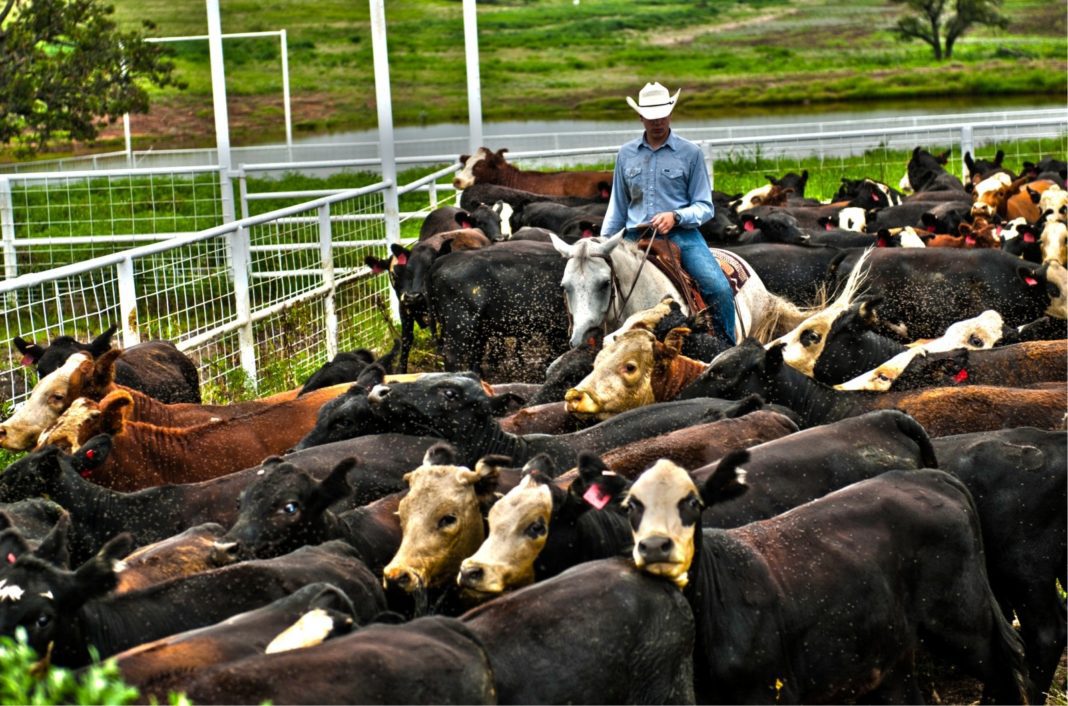The Cowboy Way
It’s changed. Ranching. There’s little doubt of this, when ranchers are better educated, better acquainted with the use of technology and capable of employing it to meet the ever-increasing global demand for protein.
With change has come challenges. Draught has certainly been among those chief challenges. In the past few years, some ranchers have driven out of state to acquire hay necessary to supplement herds. Prices have risen astronomically for the cattle-raising necessities. In 2013, in parts of the state, draught impact has retreated.
“Statewide, yes, there are areas with lots of hay – it might even turn out to be the largest haul of hay in a long time,” says Reese. “But other parts of the state, particularly the southwest part of Oklahoma, might not be as bad as 2011, but they aren’t much better. Certainly they have not received enough rain to recover. But if you look at the ‘green map’ of 2011 compared to that of 2013, there has certainly been improvement in some areas.”
Reese says that draught and the powerful effect of Midwest weather are the chief challenges to ranching today.
“We’re very dependent on weather,” he says. “When weather is good, things are good. When weather is dry, there are very many challenges.”
In a tough marketplace, Drummond says that the margin of error has shrunk dramatically.
“My grandfather’s operation could afford to be less precise,” he says. “Now, with the prices of vaccinations, machinery, supplements and capital improvements – even the price of land – the capital to have an economy of scale requires great skill and offers smaller margins. We make less money than we did 10 years ago. That’s the biggest challenge: economic viability. The only answer is debt management; you can’t carry debt.”
After ecological factors, Kelsey calls federal regulation the third-largest challenge to ranching today.
“It’s a long-term trend,” he says. “The EPA (Environmental Protection Agency) has introduced well over 1,000 rules and regulations over the past six years. Not all have been enacted. But we’re seeing a trend toward a federal government push for more, beyond even current regulation. Regulation is pushing up the cost of compliance; plus there is a higher cost of transportation. We’re heavily dependent on the cost of transportation. Plus there’s the particulate matter material regulation – dust – and fuel storage regulations. It’s definitely a trend.”
Hutchison sums up recent federal regulation easily.
“It’s getting tough,” he says. “As one tiny example, I had to go 70 miles to get a CDL license to operate machinery on my own land. It’s so many things, from so many different angles, that there are new regulations daily. Plus, obviously we have to pay attention to inheritance taxes and such. Passing down the ranch to the next generation has always been the plan, and we have to watch to make sure that will somehow still be possible. We all meet twice a year just to discuss how to keep up with the tax environment to try to keep property in the family.”
The past few years have been challenging, theoretically, to rural people, farmers and ranchers. Even before being elected, President Barack Obama said his plan for energy included necessary increases in the cost of energy; and subsequent proposed policies have included an attempted ban on youngsters under 16 doing work on family farms and ranches, environmental controls over both dust and hay that would have conceivably eliminated the small farmer and a tax on cows for their excretion of gases contributing to “climate change.”
Drummond feels less oppressed by new regulation and proposed regulation.
“A properly run ranch has zero concern for regulation,” he says.
Reese points out that farmers and ranchers are fiercely independent and generally not excited about new regulation. After all, agriculture policy in Washington D.C. is mostly driven by support for the growing of corn for ethanol, which enriches many large corn growers, particularly in Iowa, the location of the first presidential caucus and to whose fidelity candidates for higher office must pledge.























